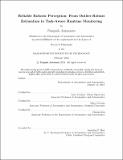Reliable Robotic Perception: From Outlier-Robust Estimation to Task-Aware Runtime Monitoring
Author(s)
Antonante, Pasquale
DownloadThesis PDF (25.07Mb)
Advisor
Carlone, Luca
Terms of use
Metadata
Show full item recordAbstract
Reliable perception is a key prerequisite for safe operation of robots and autonomous vehicles. The future of the field relies on public trust and provable correctness of behavior in real-world scenarios. Though commonly used, testing and simulation alone are insufficient to ensure correctness and do not provide sufficient evidence for safety certification. The current literature lacks a system-wide framework to formally verify the safety requirements of the perception system of an autonomous vehicle. Moreover, current perception algorithms tend to fail in the presence of many outliers and require extensive parameter tuning. This thesis presents a comprehensive exploration of outlier-robust estimation algorithms, perception monitoring, and risk assessment to enhance the robustness and safety of robots and autonomous vehicles.
The first part of the thesis focuses on geometric perception, which is the task of estimating geometric models (e.g., poses) from sensor measurements (e.g., LiDAR scans). Geometric perception is plagued by the presence of outliers —spurious measurements— that compromise the accuracy of the estimated geometric model. Computing robust estimates in the face of outliers has been a central topic in computer vision and robotics. In this thesis I introduce two unifying formulations for outlier-robust estimation, and investigate fundamental limits, practical algorithms, and applications. In particular I present two outlier-robust estimation algorithms (together with two variations that are parameter-free), that are able to robustly estimate geometric models in the presence of a high percentage of outliers.
The second part of the thesis focuses on task-aware runtime monitoring of perception systems in high-stakes robotics applications such as autonomous vehicles. Safety and performance are key enablers for autonomous driving: on the one hand we want our autonomous vehicles to be safe, while at the same time their performance (e.g., comfort or progression) is key to adoption. In this thesis I formalize the problem of task-aware runtime monitoring and present a framework that uses the diagnostic information present in the perception system to detect and identify faults at runtime, while assessing the risk they pose to the autonomous vehicle.
Date issued
2024-02Department
Massachusetts Institute of Technology. Department of Aeronautics and AstronauticsPublisher
Massachusetts Institute of Technology